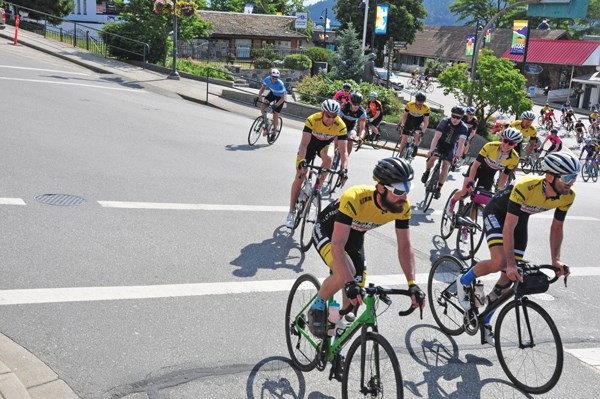After seven years of growth, the Gibsons Grind Gran Fondo has been cancelled due to safety concerns, with no firm plans for resurrection.
“I work with a number of people who used to ride it,” said Larry Reid, one of the event’s founders. “They’re all disappointed.”
Organizers of the popular June cycling event announced the cancellation on their website and on social media in January, citing an increase in vehicle traffic and “a deterioration in the quality” of the Sunshine Coast Highway. “The Grind participants are put at more risk than we would like and hence our decision to cancel,” the announcement said.
In 2018, organizers received more feedback related to safety issues than other years, according to organizer Tim Hoffman. “We’ve had concerns previous to this year but the feedback we got back and what we saw on the roads in last year’s event, it just opened our eyes a bit that we need to take a hard look at this,” Hofmann told Coast Reporter.
Cyclists of all abilities toured the Lower Sunshine Coast using Highway 101 and stretches of secondary roads such as Lower Road in Roberts Creek, Redrooffs Road in Halfmoon Bay and Norwest Bay Road in Sechelt.
The Cycling BC-sanctioned event was growing annually. Last year’s ride was capped at 350 registrants and sold out in two and a half hours, with up to 500 people on the waitlist, according to Hofmann, who said the tour could have easily attracted more than a thousand cyclists.
Hofmann attributed the event’s popularity to its proximity to Vancouver, the scenery and the challenge of the ride. “It’s got huge potential,” he said.
But that popularity may also have contributed to its downfall. Other popular long distance rides, such as GranFondo Whistler and the Penticton gran fondo, attract enough cyclists to justify closing a lane of traffic to motorists. That’s not possible with the Sunshine Coast’s two-lane highway, said Hofmann. “The real issue is, to try and make it bigger you’d have to close roads, and with Highway 101 being the way it is, it just doesn’t make sense.”
Reid also raised the issue of volunteer burnout, since the ride is organized by a small group of volunteers.
The conditions of the shoulders and bike lanes on which cyclists depend also factored into their decision. Problems included sand and other debris in bike lanes, disappearing bike lanes and overgrown vegetation.
Alun Woolliams, president of Transportation Choices Sunshine Coast (TraC), a community group that advocates for cycling, had been involved in efforts to advocate for safer shoulders. “Poor conditions have caused a real economic loss to local businesses,” he said in an email to Coast Reporter. “It is unfortunate to lose such a successful event, which brought hundreds of visitors to the Coast every summer.”
In one instance two years ago along Lower Road near Camp Byng, sections of shoulder were patched with asphalt, but pieces broke away, creating pancake-sized divots with sharp edges. “It caused somewhere in the neighbourhood of 20 flats and a couple of damaged wheels,” said Reid, who volunteered as a mechanic that year.
“If you’re in a big group of cyclists … it can lead to some pretty dangerous situations.”
Another issue raised was vegetation growing on the shoulder, reducing space for cyclists.
Capilano Highway Services, under contract with the Ministry of Transportation (MOTI), clears shoulders of knotweed, blackberry brambles and other vegetation and maintains Highway 101 and Sunshine Coast Regional District (SCRD) roads.
Last July, TRaC raised the issue of what they called “dangerous potholes” near Camp Byng at am SCRD meeting, and asked for a revised vegetation clearing schedule. A MOTI representative was absent from the meeting and the committee recommended that the SCRD write to the ministry about public safety concerns related to the clearing schedule.
Capilano Highways is currently under contract negotiations with the ministry and no schedule changes have been requested of them by MOTI.
Both Reid and Hoffman also acknowledged that with more riders on the road, and with many unfamiliar with Coast cycling conditions, the chances of “close calls” also grew. “Cyclists and motorists are the problem, it’s not one group or another,” said Reid. Hofmann said volunteers reported some cyclists “were a little too trusting” of motorists.
It’s unclear at this point whether Gibsons Grind is gone for good.
Hofmann said he remains hopeful that with improvements to shoulders and bike lanes, or with a new bypass, the fondo will return. “There is a local group of us here, we all like cycling on the Susnhine Coast,” he said. “We can bring it back.”



